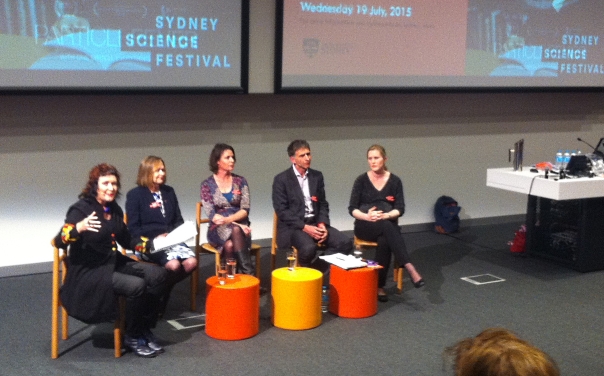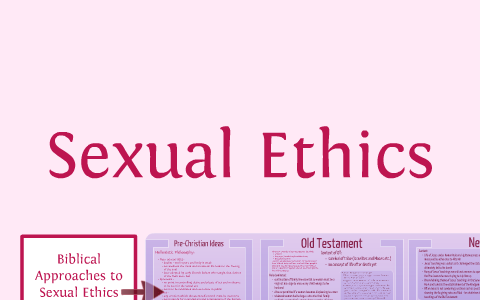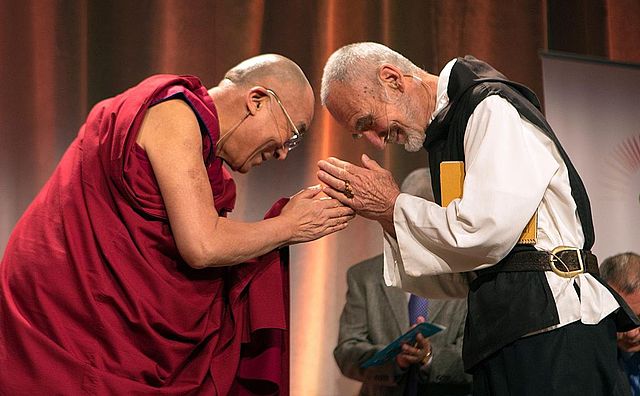Here’s a belated liveblog of the panel, which I thought would be focussed on making our definition of wellness more scientific but was actually about the wellness (ie. CAM) industry. There’s also a podcast about the panel on Radio National. DO NOT READ THE COMMENTS ON THAT PAGE! The panelists were:
- Natasha Mitchell from Radio National as the moderator (NM in this post)
- Professor Margaret Allman-Farinelli, a nutritionist (MAF)
- Christopher Zinn, a consumer advocate (CZ)
- Dr Sarah McKay, a neuroscientist turned science blogger (SM)
- Liz Graham, editor of body+soul (LG)
Italics are comments from me.
NM: How many of us have had the experience of feeling unwell, going to the GP, getting a prescription, specialist referral or test and being out in 15 minutes? The rise of the wellness movement is a response to this, patients trying to take control of their wellbeing. While many call this evidence-free, I think it’s a valid response to “mainstream” medicine. There’s a bit of false equivalence here, even if the motivation is valid, it doesn’t mean any particular modality (or ANY CAM modality) has any merit.
NM: Why the rise of the wellness movement?
MAF: Modern lifestyle is leading to stress and the wellness industry has perceived benefits. People are motivated because of public health messaging around obesity. This motivation is positive in people choosing wellness. It’s a very false choice though because most people have no idea how the vast majority of CAM has either not been proven to work or been proven not to work.
LG: Aging population wanting quality of life. Rising rates in cancer and heart disease, fear of dementia. Rise of social media for promoting the personal story.
NM:Is this about the consumer taking charge?
CZ: It’s about a determined producer disrupting science and authority based on demand. You can make claims in CAM that mainstream medicine won’t dare make (and legally cannot make). The industry is aligning itself with products, TV shows etc, but if you just blog you can say anything. Exactly, there are two completely different standards of evidence.
NM:How did you get into science blogging?
SM: There was a complete lack of scientific basis to wellness blogs so there was a gap to fill. The use of personal/warm/friendly voice is important in my blogging, compared to mainstream medicine’s comms. In brain health, there are lots of magic solutions (eg. superfoods) so the non-scientific bloggers offer solutions that science never can.
NM: Hasn’t science ignored the aspects of food and nutrition? Uhm, 320000 papers about it on PubMed.
MAF: There are unanswered questions but medicine has specialisations and nutritionists like me exist! There are more answers than people think, we understand the basic nutrients. Now, we need to take a proper look at the relationship between nutrients and prevention of disease. Some lifestyle diseases are spiking only recently (eg. Alzheimers due to ageing population) so we haven’t had much of a chance to do long-term studies.

NM: The vast majority of vitamins that people buy, they will just wee out. Why do people take them?
CZ: It’s very well-marketed. There’s confirmation bias (“it works for me”).
NM: How do you curate content for body+soul? Any lines in the sand?
LG: Our aim is to make readers feel good, inspired, topic of conversation and to benefit. A very telling order of priorities We do have a horoscopes page but we have a panel including academics, naturopaths, “holistic GPs”. The definition of false balance. The anecdote is very powerful. We covered Jessica Ainscough but we don’t delve too much in CAM with cancer as it’s a very dangerous topic because of people’s fears. We understand that including something as a supplement is validating it implicitly; we take this seriously.
CZ: It’s fine, if people refuse treatment based on beliefs (eg. Jehovah’s Witnesses and transfusions) that has to be fine. The consumer protection aspect is paramount. But even though the wellness industry sows confusion so do scientists.
NM: How do scientists engage with wellness industry?
SM: They bitch amongst themselves, eg. on Twitter. There was recently a panel on Neuroscience in Business without any neuroscientists included and neuroscientists mocked it brutally. They feel science is being hijacked and misused but they can often be arrogant and dismissive in their response.
MAF: Scientists don’t have a lot of training in communication. The media presents conflicting messages because studies are not sufficiently put into context. One pet-peeve is people think our food supply is poor in nutrients so we should take supplements. In reality it’s only if you have some specific reason (eg. deficiency, chronic desease etc). For this reason, the new recommendations for cancer patients is not to take supplements (esp. vitamin A) as that can increase the likelihood of cancer.

Over to audience questions, I’m including only a selection.
Q: What role does the media play in dumbing down the stories and what could be done?
LG: We need more journalists with a science background.
CZ: Journalists will always want a story so it’s about bringing out the narrative.
SM: People don’t always want facts, they may want emotional ways to engage.
MAF: There may be a particular journalist who is best-placed to get the message across.
NM: In my career I’ve operated under the conviction that nothing is too complex to cover on radio (if told in an interesting way). And with Ratio National people want it. A lot.
Q: Where’s the line for regulation when people are negatively impacted by CAM misinformation?
CZ: Compare to financial industry. Regulation is ineffective (unless product is described in the way against the law). We have to accept the lack of protection and take some responsibility. You can now look at anti-Big-Pharma stuff 24/7. Ayn Rand sends her regards…
MAF: It’s unrealistic to regulate speech as opposed to increasing the education level.
CZ: Health literacy doesn’t necessarily stop polarisation. If you teach financial literacy it falls off very quickly. Teaching maths is actually more effective. Same for health –– if we understand statistics we’ll flag the N=1 much better.
NM: Is gluten maligned?
MAF: Yes but it’s almost getting too old and it’ll be trendy to malign something else.
LG: Diets that exclude food groups work can well but mainly because of more vegetables.
MAF: Paleo diet is useful in eating less processed foods but just cuts out too much (eg. whole grains and dairy).
LG: A bit factor in paleo’s success is the sense of belonging.
SM: Too right! Pete Evans blocks people who don’t believe in Paleo but there’s a Blocked by Pete Evans page.
Q: As a sports dietician I get athletes that don’t eat any sugar or because of Pete Evans. It’s easy to forget the original aim of nutrition is is meeting people’s INDIVIDUAL needs.
MAF: Were you able to convince the athlete to eat sugar?
A: Yes since I’m in a powerful position. But there’s a lot of confusion. Lots of very big guys who are athletes eating very little because of nutritional misinformation.
Q: Are we failing on our mandate of communicating science to the public by being forced to publish in peer reviewed journals that the public can’t access? [Applause] As an unqualified person I can get views out on social media platform but someone with 10 years of expertise doesn’t get the same platform.
MAF: The growing open access movement is great. The downside is the journal wants to charge me $2.5-3k for each article that’s published.
CZ: As general readers, we probably just want the abstract.
Q: This is a privileged discussion in terms of wellness being excluded from parts of the community. How can the wellness movement be more accessible to those who are less privileged to be more empowered with health? Just providing information isn’t enough.
CZ: Someone from the communities needs to be driving it as a project from within. Although maybe having My Kitchen Rules or some other major brand reach out will do wonders too. It is a problem.
Q: If you follow a good diet and exercise you don’t need a wellness movement. Shouldn’t the emphasis be about developing people’s character to chase a goal? Wellness is the equivalent of get rich quick. Hmmm, everyone should have character eh?
NM: At the end of the day it’s a lot more simple than we might make it out.
MAF: The message is not complex but it’s difficult. The problem isn’t the fad diet because those don’t last anyway. We want to make it easier for people to make those more permanent lifestyle choices.
Q: In defence of the wellness warriors, the standard discourse talks about food as science, which leaves a gap about food as food (ie. people cooking at home). We’re also being marketed to by food manufacturers who are not taking responsibility, but wellness bloggers inspire people.
CZ: It’s probably not useful to paint the whole industry with a broad brush but there’s a lot of crap out there. We’re so busy and we keep buying “convenient” food. The solution may be education and realising that some of this food is not that convenient.
Closing remarks.
CZ: Remember to ask whose interests are being served for a particular piece of information? The ‘who benefits?’ question is the cornerstone of conspiracy theories so it may not be that useful.
LG: If it sounds too good to be true it probably is.
SM: On Food Babe, anti GMO activists causing havoc in NZ etc: we need more scientists to get a backbone, and start playing at the activism game too. Amen to that!





0 Comments